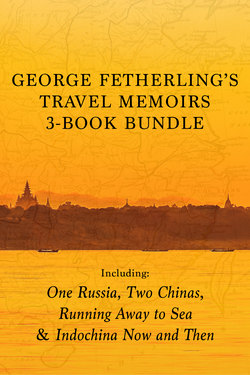Читать книгу George Fetherling's Travel Memoirs 3-Book Bundle - George Fetherling - Страница 15
На сайте Литреса книга снята с продажи.
— A BISTRO TALE —
ОглавлениеJapan’s stated aim in the 1930s was to drive Westerners out of coastal Asia, north as well as south (so they could have it all to themselves); the name they gave this grand design was the Asia Co-Prosperity Sphere. Once they had been defeated in the Second World War, they saw the remarkable extent that expansionism based on dislike of Westerners survived in other people’s hands under another banner: independence. In country after country, such Asian nationalism ended the Europeans’ colonial rule from the later 1940s through the 1960s. The West reclaimed the territories that Japan had overrun, but would lose them again, permanently this time, to ideologies far removed from Japanese fascism. The British relinquished India, of course, but also Burma, Singapore, and Malaya, just as the Dutch were forced to give up Indonesia and the French, Indochina.
In Southeast Asia, just as everywhere else, race always has been an important element in the way societies are organized. So it is that today Cambodia, like its neighbours, doesn’t display much affection for the Western workers, expats, and visitors who reside there. It only tolerates them for what’s in their pockets. As is also the case in Vietnam and Laos, foreigners aren’t permitted to own real property, no matter how long they’ve lived there (whereas Thailand, slightly more liberal, allows Caucasians to own condos but not houses).
I was disappointed to learn that Cambodia’s rattletrap system of passenger trains, which often broke down temporarily en route, finally did so permanently. Now only freight is carried, very very slowly, on the rapidly deteriorating right-of-way. This was inconvenient news because I wished to get out of Phnom Penh for a couple of days and go to Battambang, to the northwest, where I was told there was a concentration of old French buildings less deformed by the needs of commerce than those in the capital. Some maps show a small airport at Battambang, but they are incorrect. There is, however, a bus service. Compared with the train, which used to take eighteen hours or so, the bus requires only eight or nine hours, but is, people warned me, quite uncomfortable. For example, it had air conditioning with only one setting — full blast — but no toilet, and I was told that it was unlikely that I would meet anyone I could communicate with. So there was no question of what to do: I borrowed somebody’s mobile and phoned Vorn. He reminded me of those hard-boiled private eyes of the old pulp magazines who got twenty-five dollars a day and expenses. Only in his case, the rate was fifteen dollars a day and petrol. For him, this was not too bad a deal. Cambodia’s per capita income is US$500 per annum.
I was to meet him shortly after first light at a bistro called L’Oiseau Rouge. It was a bistro in the classic European sense, a nice dark bar with a small stage and a grill that was kept hot all night. I was off in a corner by myself, carbo-loading on breakfast to see me through the long day. There were three Khmer women, one in her thirties, obviously the manager, and two very young ones, attending to various things behind the bar. There was only one other customer, an immense Australian fellow sitting at the bar with his back to me. He had red hair stored in a ponytail and was wearing a loud tropical shirt and khaki trousers. His feet, resting on the rung of the barstool, were bare. Sometime during the night, which he had obviously spent relentlessly drinking, he had kicked off his shoes and let them drop to the floor. He was still ordering drinks. Why he hadn’t been cut off, I couldn’t imagine — except that he was dutifully paying for them and also of course because without them he might have erupted in genuine violence.
There was enough material in his hideous shirt to sail a square-rigged ship. He weighed, I would guess, 120 kilos, and he was very loud and getting louder. He kept yelling Aussie endearments to the women. This was followed by reaching across the bar as far as he could stretch to grab their bottoms or grope their breasts, whichever were closer. I had a wide-angle view of all this as I sat unnoticed, peering over the top of my newspaper.
Hearing the rumpus, the night security guard appeared out of nowhere. A Khmer fellow, quite small and slight, he surveyed the situation and sensibly decided to take his lunch break early. This isn’t going to end well, I said to myself. But fortunately I was wrong. Once the customer had finished his current drink, the headwoman came out from behind the bar and, using a normal conversational tone, engaged him in chat while she slipped behind him and began giving him a shoulder massage. After five or ten minutes, he crossed his arms on the bar and rested his head in the cradle they made. A few more moments and he was sound asleep.
Of all the ways such a situation might have concluded, this was not one I had imagined. I was recounting the story to Vorn as soon as he scooped me up in his car and we set off through the still largely deserted streets. I explained what had happened, using carefully deliberate sentences, for I had noticed that his English comprehension was diminished when he was having to concentrate on the road. When I finished, he replied: “Man stay sleep when you leave. They take his money then.”
